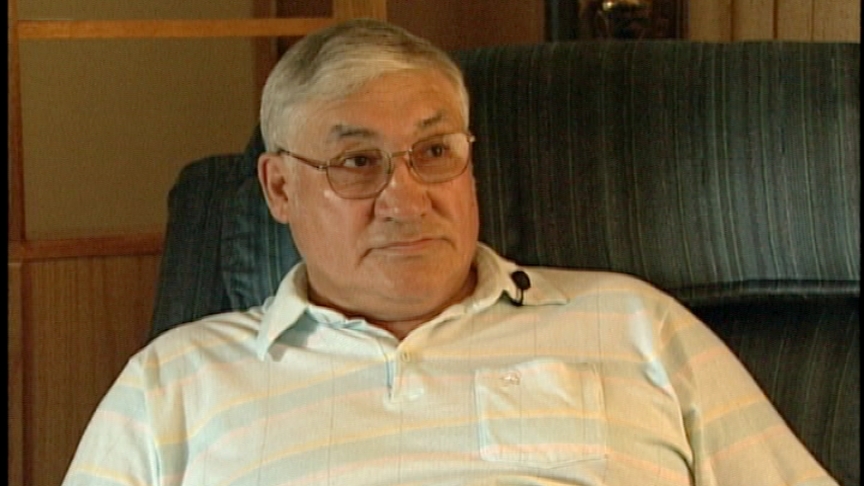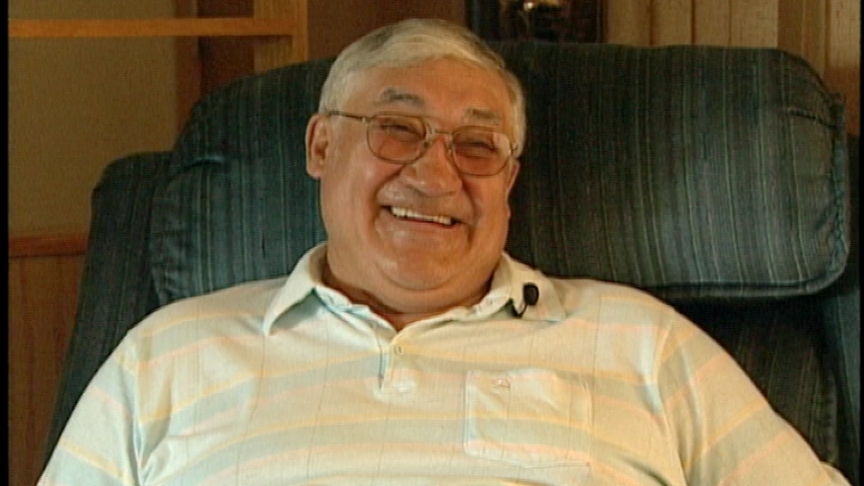Oh, we got along good. All the Americans again were, you know
they were drafted there, most of them that and they didn't want
to be there so. But the Brits the ones I know in (inaudible)
there was a tank, an armoured division there. They were always
coming over to our, to our mess hall like we had a mess hall you
know... we, we ate in the tent eh and they were always coming
over to our tent to eat. They didn't say nothing, but they were
good guys eh. They'd try to bring, their rations were
horrible oh we had, we had Brit rations, so we started getting
American rations, C7 rations. They were good, you got
cigarettes and you got cigarettes the American or the Britsh
rations they're players they called them one-two-three. They
were like toothpicks and hard you couldn't smoke ‘em and we
started on the American ones they had 2 packs of cigarettes a day
candy and all well American you know it's like, like our, our
food. They had the same thing, but everything was set up so nice
you had can heat. You'd heat up your little, your little pork and
beans or anything you wanted and they had another new thing that
came out is soup. You could light a cigarette... we had a
lot, there's alot of those in the lines you just touch it with,
with a cigarette and it'd go "phsst" and that can and you
couldn't touch it. It was hot eh. It was a hot drink. That
was, that was a real good thing and of course your shot of rum
was good too.
Interviewer: What was your reaction when you heard that
there had been a peace signed?
From where we were on our reserve position we could see the, the,
the lights the peace lights and we're just you know, we'd sit
around and say when are they gonna sign that god damn thing
you know, fighting over this bull shit and finally it was done
you know. It had seemed nearly everybody was firing their
weapons in the air, get on top of the hill and you could, and
they were coming out the Chinese. You'd see them coming out of
their trenches too. It was a great thing, but it went back to
the, the polishing you know. The old army style discipline.
You'd shine your boots and your, your hat badges and what have
you. You'd get cleaned again and start soldiering.
But it was quite an experience, then we, we took a boat back
right into Vancouver, got off , went home.
Interviewer: What's your views on the Korean Conflict and its
necessity? Well after going back you know and looking at
communists is the big thing. Like I can say it now
because I was in Cuba and I know what it's like. These people
are isolated. They're not free to do anything and I, this is why
we were there. We were trying to free some people, to support
them. I, I think that right now to this day and that's what
they're doing and I think it's needed in order to, to protect
the innocent. You, you, they have to do it.
You know a lot of people criticize the bombing and you
know there, there's two ways to look at that. Myself yeah they
should bomb. They're in the plane. You know to go, in order
to go in, send troops in there's going to be casualties, foot
troops. It is a good way and people don't realize. They
protest, they protest of the bombing, but they realize what
you know you see the graves they're digging up out there.
That's basically the same thing that was happening in Korea.
Well they overrun them right to Pusan at one time till the
Americans redone it and pushed them back to Seoul. And when,
when, when I, when we went through Seoul there was nothing
standing. It was flat. That thing was flat. There was only
the Seoul gate that was standing and I seen it on my revisit.
That was the only thing and I , the hotel I stayed in this time
was right beside there and I couldn't try and place it. I was
trying to find out where the BMH was, that British Army Hospital.
I, I thought it was in a, in it was a hospital but I thought
maybe it was in a school or university type thing.
I couldn't find it. But anyways you're talking about Korea why
yeah, I, I, think we should have been there. The, if you ever go
back, now you could see why. How these people are you know
compared to the time when I left and a lot of the other Canadians
that you know how these people looked. They were practically
starving and the way they were living. Now they're, they're
happy and certain people you know living quite well.





